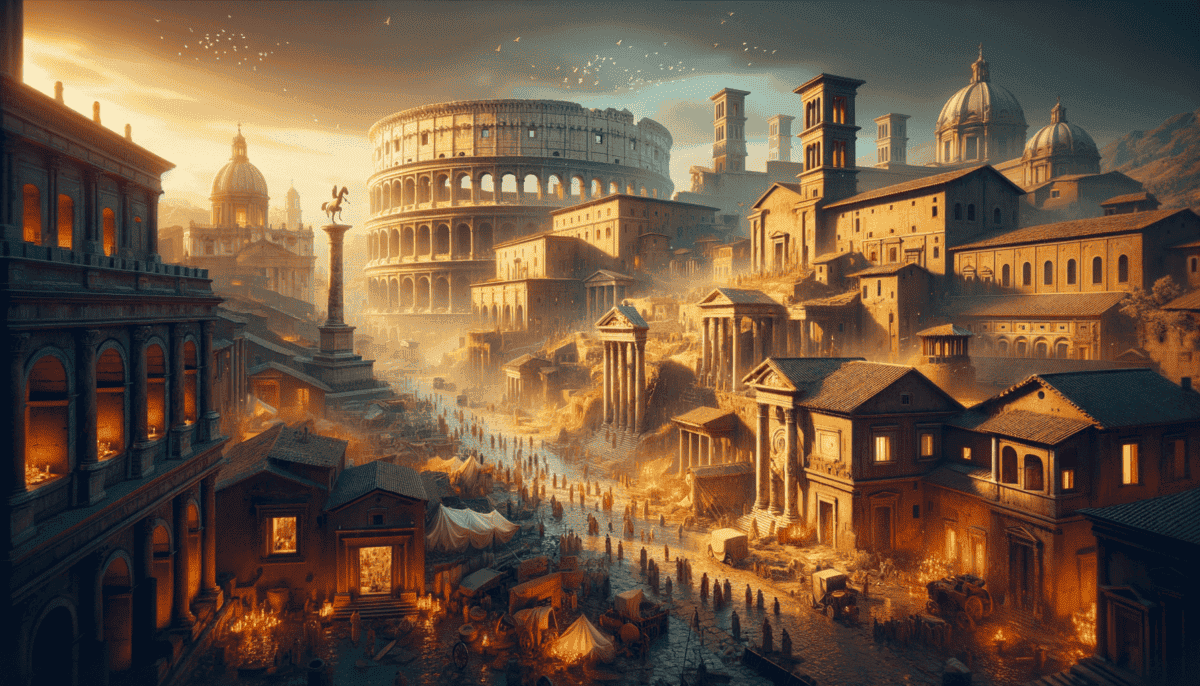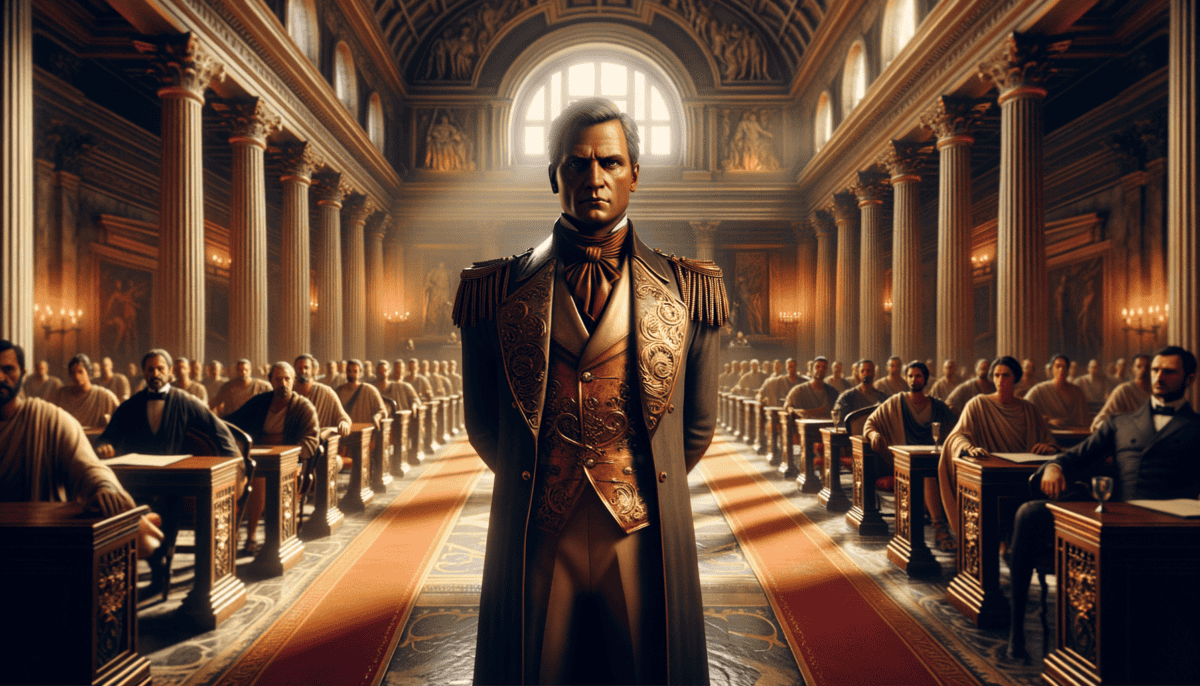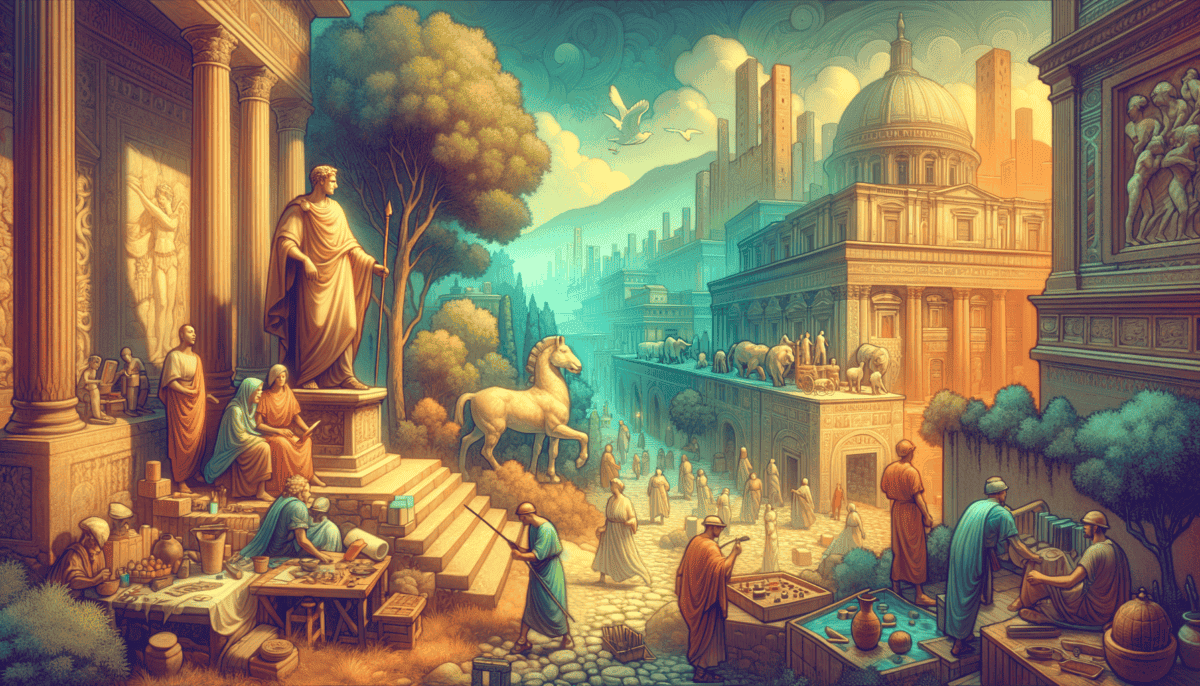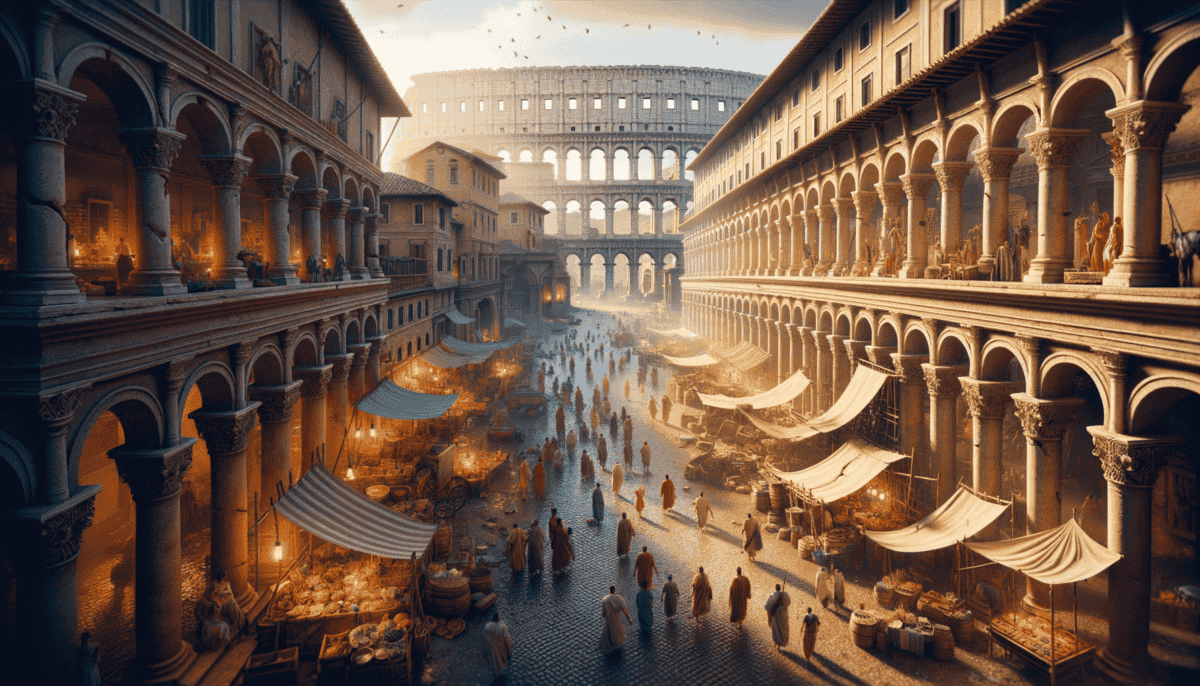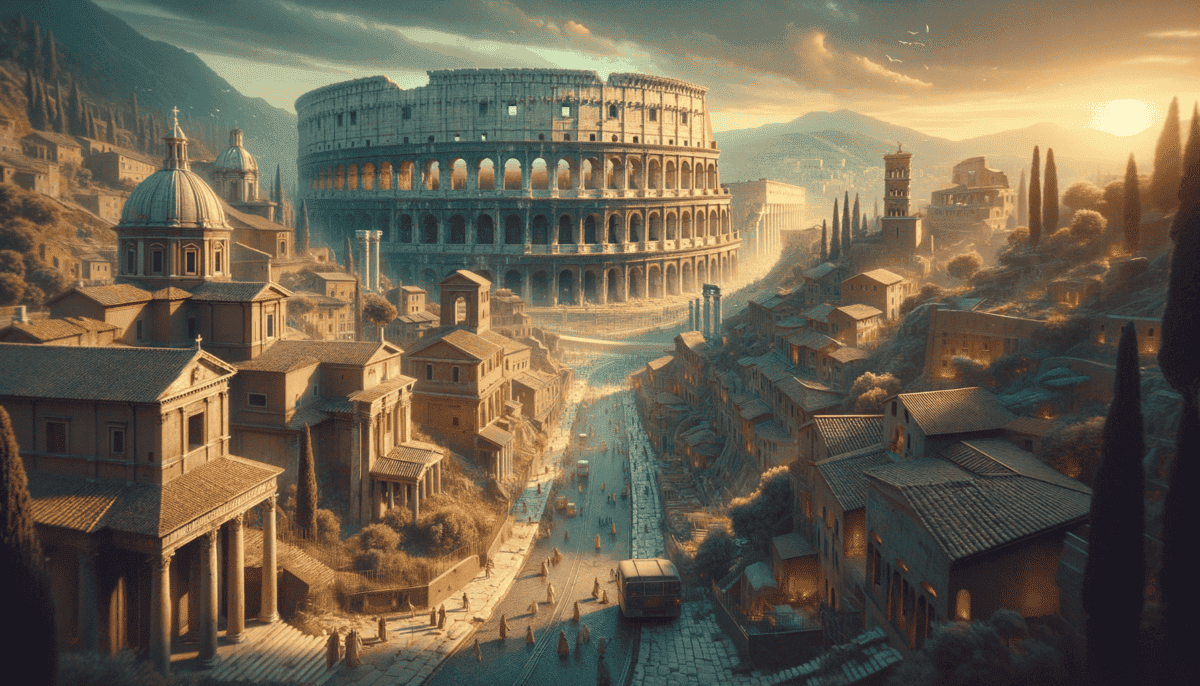The Wolf’s Children
Long ago, in a place where green hills met the gentle flow of the Tiber River, something magical happened. Two tiny babies lay in a wooden basket, floating on the water. Their names were Romulus and Remus.
"Waaah!" cried baby Romulus.
"Waaah!" echoed baby Remus.
The river carried them softly until their basket got stuck near a big fig tree. They were cold and hungry. But then, something amazing happened!
A mother wolf heard their cries. She had the kindest eyes anyone had ever seen. Instead of being scary, she came close to the babies. She fed them and kept them warm, just like they were her own wolf cubs!
As the babies grew into little boys, a nice shepherd named Faustulus found them. He and his wife took the twins home and raised them as their own children. The boys grew strong and brave.
"Look how fast I can run!" Romulus would say.
"But I can climb higher!" Remus would answer.
They played in the hills and helped take care of the sheep. But these weren't just any boys – they were princes! Their mom was a princess named Rhea Silvia, but a mean king had thrown them in the river when they were babies.
When they grew up, Romulus and Remus decided to build their own city. They picked seven hills near the river where they were found. But then they had a big fight.
"I want to build the city on this hill!" said Romulus.
"No, my hill is better!" said Remus.
They watched the sky for signs from the gods to help them choose. Romulus saw more birds than Remus, so he won!
Romulus started building walls around his hill. He used big stones and worked very hard. But Remus thought it was silly and jumped over the wall to tease his brother.
"See how easy it is to jump over your wall?" Remus laughed.
This made Romulus very angry. He loved his new city so much that he couldn't let anyone make fun of it. Something terrible happened next – the brothers fought, and Remus didn't survive.
Romulus felt very sad about his brother, but he kept building his city. He named it Roma (Rome) after himself. More and more people came to live there. They built houses, shops, and temples.
“This will be the greatest city in the world!” Romulus told his people. “We will be strong and brave, just like the wolf who saved us!”
Romulus became the first king of Rome. He made good rules for his people and taught them to be brave like soldiers. The little city grew bigger and stronger.
Every year, the Romans would tell the story of the twins and the wolf. They would say:
"Remember how our city began – with a kind wolf, two brave brothers, and a dream of building something great!"
And that's how Rome started – from two tiny babies in a basket to the beginning of something amazing. The wolf's children had started what would become one of the biggest and most important cities ever!
The city of Rome grew and changed, but people never forgot about Romulus and Remus. They reminded everyone that sometimes the most amazing things can start very small – even with just two babies and a kind wolf.
The People Take Power
The sun rose over Rome’s seven hills, but something was different that morning. The people were angry! They didn’t want kings anymore. The last king, Tarquinius, was mean and bossy.
“We want to make our own choices!” shouted Marcus, a baker who made the best bread in Rome.
“Yes! We should all have a say!” agreed Julia, who sold bright cloth in the market.
Instead of one king, Rome now had two leaders called consuls. They would only lead for one year. This way, no one could become too powerful.
“But how will we make decisions?” asked a young boy named Lucius.
The answer was the Senate – a big group of wise men who would meet to talk about important things. They sat in special chairs in a beautiful building with tall columns.
“Together, we will make Rome stronger than any king could!” declared Brutus, one of the first consuls.
The people of Rome were split into two big groups:
- Patricians – the rich families who could be senators
- Plebeians – regular people like farmers, workers, and shop owners
At first, the patricians had all the power. This made the plebeians mad.
“It’s not fair!” said Claudia, a plebeian farmer. “We work hard too!”
The plebeians did something very brave. They all walked out of Rome and sat on a hill nearby. They said they wouldn’t come back until things changed.
The patricians realized they needed the plebeians. Who would grow food? Who would make things? The city couldn’t work without everyone helping!
So they made a deal. The plebeians could choose their own leaders called tribunes. These tribunes could say “NO!” if the Senate tried to make unfair rules.
Little by little, Rome’s new government got better. They wrote down all the laws on big metal tables so everyone could see them. They called these the Twelve Tables.
Rome grew bigger and stronger under the republic. They built new roads and big buildings. Their army became very strong. More and more cities wanted to be friends with Rome.
“Look how much better things are now!” said an old man to his grandchildren. “When I was young, we had kings. Now we all work together!”
But running a republic wasn’t always easy. Sometimes people fought about who should be in charge. Rich families tried to get more power. Poor families wanted more rights.
Still, most Romans were proud of their new way of doing things. They had special words they wrote on important buildings:
SPQR – which meant “The Senate and People of Rome”
These letters showed that the power belonged to everyone, not just one person. Big changes were coming to Rome, but for now, the people had found a new way to rule themselves. ️
A Hero Rises in Rome
The marketplace buzzed with excitement. A tall man with bright eyes rode through the crowded streets on a white horse. This was Julius Caesar, and everyone wanted to see him!
“Look at his shiny armor!” shouted little Marcus, jumping up and down. “I want to be just like him when I grow up!”
Caesar had just come back from winning big battles in far-away lands. He brought lots of gold and new friends for Rome. But not everyone was happy about this.
“He’s getting too powerful,” whispered some senators in their fancy togas. They were scared Caesar might try to become king.
“The people cheer for him like he’s already a king!” worried Senator Brutus, Caesar’s friend.
Caesar did many good things for Rome:
- Gave jobs to poor people
- Built new roads and buildings
- Made the army stronger
- Helped farmers get land
One day, Caesar crossed a small river called the Rubicon. This was against the rules! No general was supposed to bring their army this close to Rome.
“The die is cast!” Caesar said, which meant there was no turning back.
Some people ran away scared. Others welcomed Caesar with flowers and cheers. Big changes were coming to Rome!
Caesar became the most powerful person in Rome. He sat in a golden chair and wore special purple clothes. But he said he wasn’t a king – he was just helping the people.
The worried senators made a sad plan. On a spring morning, they asked Caesar to come to a meeting. Caesar’s friend Mark Antony tried to warn him.
“Don’t go today!” said Mark Antony. “Something feels wrong!”
But Caesar went anyway. When he sat down in his chair, the senators pulled out hidden knives. Even his friend Brutus was there.
“You too, my son?” Caesar asked sadly when he saw Brutus.
The senators thought killing Caesar would save the republic. But they were wrong! The people were very angry. They loved Caesar and wanted revenge.
“Caesar was our hero!” cried the people. “He cared about us when the rich senators didn’t!”
Mark Antony spoke at Caesar’s funeral. He showed everyone Caesar’s torn clothes and told them about all the good things Caesar had done. The people cried and lit fires in the streets.
Caesar’s nephew, young Octavian, promised to continue his uncle’s work. The republic was ending, but something new was about to begin. Rome would never be the same!
That night, people said they saw a bright comet in the sky. ⭐ They thought it was Caesar’s spirit going up to live with the gods. Even today, we remember Julius Caesar as one of Rome’s greatest leaders.
The Golden Age Begins
A young man stood on a marble balcony overlooking Rome. This was Octavian, Julius Caesar’s nephew. The morning sun made his golden laurel crown sparkle. ✨
“Rome needs peace now,” Augustus said to his friend Agrippa. “No more fighting between Romans!”
The people cheered when Augustus walked through the streets. They remembered how sad things were after Caesar died. But Augustus made everything better!
“Look!” shouted a little girl named Julia. “The streets are clean, and there’s plenty of bread for everyone!”
Augustus worked hard to make Rome beautiful and safe. He liked to say, “I found Rome in bricks and left it in marble!” Here’s what he did:
- Built beautiful temples and buildings
- Made sure everyone had food
- Created a fire brigade to keep the city safe
- Fixed all the old roads
- Started a mail service
One day, Augustus visited a new school he had built. The children were learning to read and write on wax tablets.
“What do you want to be when you grow up?” he asked a small boy.
“I want to build roads like you do!” the boy answered proudly.
Rome grew bigger and stronger during this time. People called it the “Pax Romana” – the Roman Peace. ️ Traders could travel safely, artists made beautiful things, and farmers grew lots of food.
“Augustus keeps his promises,” said a merchant at the busy harbor. “My ships can sail without fear of pirates now!”
Even far away in places like Britain and Egypt, people were happy to be part of Rome. They learned to speak Latin and built their own Roman buildings.
“We’re all Romans now!” said a proud British chief wearing a Roman toga.
Augustus was also kind to his family. He loved his wife Livia and his daughter Julia very much. He taught his grandsons everything about being good leaders.
At night, Augustus would walk through the city to make sure everyone was safe. Sometimes he stopped to talk with regular people about their problems.
Artists made beautiful statues of Augustus. In them, he looked young and strong, like a god. But Augustus told people, “I’m just a regular person trying to help Rome.”
One evening, Augustus sat in his garden with Livia. “What makes you most proud?” she asked.
“That Rome is at peace,” he smiled. “Children can play without fear, and parents can sleep without worry.”
When Augustus was very old, he knew his time was ending. He called his friends close and asked, “Did I play my part well in the story of Rome?”
“The best part!” they answered. “You gave Rome its golden age!”
The sun was setting over the seven hills of Rome. In homes across the city, parents told their children stories about the peace and happiness Augustus brought. They knew these would be days to remember forever.
Life in the Eternal City
The sun rose over Rome, painting the marble buildings golden. Marcus, a young boy living in an apartment building called an insula, woke up to the smell of fresh bread.
“Wake up, Marcus!” called his mother. “The city is already busy!” She handed him a warm piece of bread and honey for breakfast.
Marcus looked out his window at the bustling streets below. People were everywhere! Shopkeepers opened their stores, workers carried heavy loads, and children played with wooden toys.
“Look at all the different people!” Marcus said. “Some wear togas, some wear tunics, and some have clothes I’ve never seen before!”
His friend Claudia lived next door. She was excited today because her family was going to the public baths. “The baths are like a big playground!” she told Marcus. “We can swim, play games, and hear stories!” ♂️
Roman kids had lots of fun things to do:
- Play ball games and hop-scotch
- Watch exciting chariot races
- Go to the huge public baths
- See shows at the amphitheater
- Learn at school
“Can we go to the Circus Maximus today?” Marcus asked his father. “I want to see the chariot races!” ️
At the races, Marcus saw people from all over the empire. Some came from far away places like Britain, Egypt, and Greece. They all spoke different languages but could talk to each other in Latin.
“Rome is like a big family,” his father explained. “We’re all different, but we’re all Romans too!”
After the exciting races, they walked through the Forum – the busy center of Rome. Marcus saw:
Priests in white robes going to temples
Soldiers marching in shiny armor
Merchants selling purple cloth and spices
“I’m hungry!” said Marcus. They stopped at a street food shop called a thermopolium. It was like an ancient Roman fast-food place!
“One hot soup and fresh bread, please!” his father ordered.
That evening, they went to see a play at the theater. The actors wore big masks and told funny stories. Everyone laughed together, rich and poor, old and young.
At night, Marcus watched the lamplighters going through the streets with their torches. The city glowed under the stars. ✨
“What’s the best thing about living in Rome?” his mother asked as she tucked him into bed.
“Everything!” Marcus smiled. “The games, the food, the stories, and all the different people. Rome is the most exciting place in the world!”
As he fell asleep, Marcus could hear music from a party nearby, the distant sounds of people talking in the streets, and somewhere, a night watchman calling out the hours. This was life in the greatest city on Earth.
End of an Empire, Birth of a Legacy
The great city of Rome wasn’t as bright as it used to be. Marcus, now grown up, watched as things began to change. The streets weren’t as busy, and fewer ships came to the ports.
“Father, why are so many shops closed?” asked Marcus’s daughter Julia. She noticed many empty buildings where busy stores used to be. ️
“Times are changing, little one,” Marcus replied. “But remember, Rome has faced hard times before.”
“Our city is like a mighty tree. Even if some branches fall, our roots are strong and deep!”
The empire had grown too big to control. It split into two parts:
- Western Roman Empire (where Rome was)
- Eastern Roman Empire (called Byzantium)
- Each had its own ruler
- They spoke different languages
- They had different ways of life
But not everything was getting worse. Julia loved learning about all the amazing things Romans had built: ️
Long roads that connected far away places
Strong bridges that still stand today
Big buildings made of concrete
“Look at these roads, Julia!” Marcus pointed. “Romans built them so well that people still use them today!”
One day, Julia came home excited from school. “Teacher says Roman ideas help people even today!”
“That’s right!” Marcus smiled. “Our laws, our language, our buildings – they’re like gifts we gave to the future.”
Even as the Western Empire got weaker, Roman ideas stayed strong:
️ Our letters come from Roman writing
⚖️ Many laws come from Roman rules
️ Cities use Roman ways of building
Our calendar comes from Rome
In 476 CE, the last Western Roman emperor lost his crown. But that wasn’t really the end. The Eastern Empire kept going for almost 1,000 more years!
“The empire may be changing,” Marcus told Julia, “but look at all we’ve built! Our roads, our words, our stories – they’ll last forever!”
“Rome isn’t just a place,” Julia said wisely. “It’s all the good ideas we share with the world!”
Marcus hugged his daughter. Even though the empire was ending, he knew Rome’s story would live on. People would study Roman ideas and use Roman inventions for thousands of years.
Walking through the Forum one last time, Marcus saw more than just old buildings. He saw the spirit of Rome that would never die – in its laws, its language, its art, and its stories.
As the sun set over the eternal city, Marcus smiled. Rome’s greatest gift wasn’t its power or its gold. It was the ideas and dreams it gave to the future. Like the roads they built, these would last forever, connecting the past to all the days yet to come. ✨


